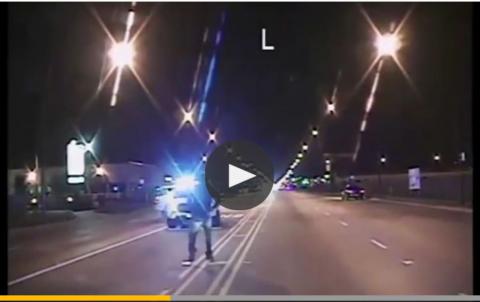[To view video of the Chicago police killing of Laquan McDonald and a report on the protests that have been held in response, click here. -- moderator]
The video of Laquan McDonald being shot horrifies in its banality. I’ve been seeking the video since April and, prompted by my lawsuit, it was released Tuesday, shortly after the officer who allegedly shot him was charged with murder.
The police dashboard camera footage shows a Chicago officer shooting 17-year-old Laquan. But it’s utterly without fireworks. It’s perfunctory.
The lack of sound, and the cold way the officers moved and behaved, made a horrifying act seem almost mundane. The tape shows Jason Van Dyke, the officer now charged with Laquan’s murder, leaving his police car. A few short seconds elapse with Van Dyke’s gun drawn and, before Laquan has a chance to say anything, the teen falls to the ground. That’s it. To the world, Laquan died quietly. Officers stand around, not helping the boy, seemingly securing the scene from an invisible threat.
Little did they know: the threat is them.
The arm of government that investigates police misconduct here in Chicago, the Independent Police Review Authority (IPRA), has found only one police shooting in the past five years to be “not justified”. This leaves all the others, nearly 400 shootings, to be considered “justified”. And it leaves the impression that police here sparkle with unicorn magic.
But communities of color know otherwise.
“It’s an all-out extermination campaign,” says William Calloway, my friend and the inspiration behind my initial Foia request for the video. Before the lawsuit and before the request, Calloway told me that I should try to pry the video loose where a bunch of other news organizations (14, to be exact) had refused. As an activist, Calloway works with the families of victims of police violence.
“People need to know that Chicago has some of the most police shootings in America, and that more than 70% of them are perpetrated against people of color,” Calloway says, citing data uncovered by the Better Government Association and others. “People need to know that communities of color are policed differently, policed much more violently, than in predominantly white communities. And people need to know that police are not being held accountable. And all this needs to change.”
Mayor Rahm Emanuel keeps implying that this incident is a one-off situation. But that’s wrong. And Emanuel hasn’t mentioned that others acted improperly that night, too. At least five other officers didn’t approach Laquan as he took his last breaths. Police deleted the parts of the surveillance tape from across the street that showed the murder. Witnesses have said that they were not interviewed about what they saw but rather told to leave at penalty of arrest.
Minutes later, police lied to a spokesperson preparing to brief reporters, saying that Laquan “lunged” at officers. (The video shows he was walking away from all officers.) And last but not least, an investigation into the shooting, led by Cook County state’s attorney Anita Alvarez, should have taken weeks at most – not 13 months. Lest we forget, video showed what happened.
Everyone responsible for these situations deserves charges ranging from obstruction of justice to accessory to murder. Emanuel has yet to say anything except to condemn officer Van Dyke. He spent the vast majority of the press conference he held Tuesday singing the nonspecific praises of our city and our police officers. Even the answers to reporters’ pointed questions somehow pivoted to how great we’re doing as a city – at a press conference called to discuss police violence.
In many ways, our city is great. But William Calloway knows firsthand how low Chicago can go. He knows the grief of families who learn the mundane, sometimes inexplicable, details of when police get violent. These families deserve answers. Emanuel should be discussing the data on police shootings, specifics about their frequency, specifics about how he’s working to lower them and how he’s demanding more honest investigations into them, over at IPRA.
The video seems so everyday, so scarily commonplace. And coming after a stream of similar images from across the country – of Sandra Bland, of Tamir Rice, of Walter Scott – its significance should not be. I want it to have meaning. Laquan’s death has the potential to have meaning – particularly for other people of color, who should not have to be afraid of our police. As the statistics stand, they have reason to be.
Brandon Smith is a Chicago-based independent journalist who, with the help of whistleblowers and the Freedom of Information Act, has reported on civil rights abuses, privatization of public assets, digital privacy concerns and pollution of land and water.


Spread the word